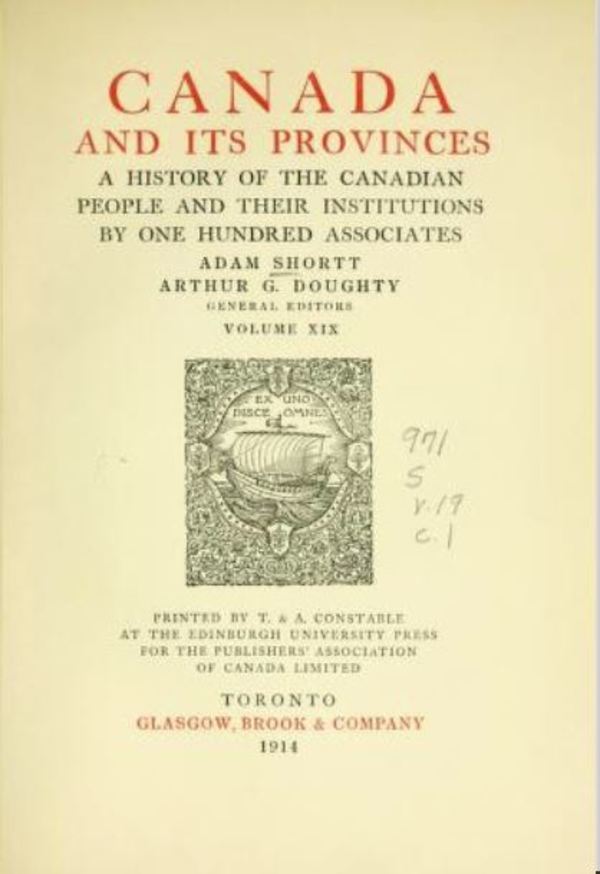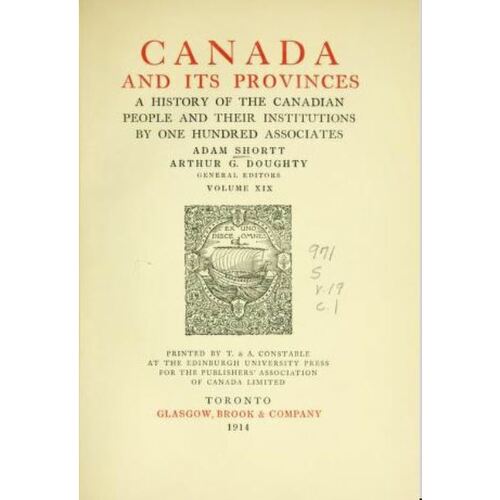
Source: Link
GLASGOW, ROBERT POLLOCK, bookseller and publisher; b. 3 Sept. 1875 near Shipton, Que., son of William Glasgow and Helen Tough; m. 16 June 1897 Louise Campbell Barter in Fredericton, and they had two daughters and two sons; d. 5 April 1922 in New York City.
Robert Glasgow’s father immigrated to the Eastern Townships from County Londonderry (Northern Ireland); he settled first in Sherbrooke and then, in 1874, he acquired a farm near Shipton. His death when Robert was 12 brought the boy’s public school education to an end: as the eldest of six children, he had to find work to help support his family.
By the age of 15 Glasgow was canvassing the local countryside, peddling books published by subscription. He continued in this business, which presented a serious challenge to traditional bookselling, through his twenties. He worked briefly for the Bradley-Garretson Company Limited (Brantford, Ont.) and Morang and Company (Toronto), and then represented R. S. Peale and Company (New York), selling Charles Dudley Warner’s Library of the world’s best literature in Australia and the Encyclopedia Americana in the United States and Canada. In 1906 he became a sales agent for George Nathaniel Morang*’s Makers of Canada, a 20-volume series published by subscription between 1903 and 1908 in Toronto. Designed to provide a history of Canada through studies of its major figures, the series, though of uneven quality, sold well.
By 1907 Glasgow had moved to Toronto, where, in addition to pushing Makers, he briefly took on bread-and-butter work as a departmental manager for Scientific American (New York). He was convinced by his involvement with Makers that a market existed for books on Canadian history, and although the vogue for subscription publication was over, he saw its usefulness for selling prestigious releases. By 1909 he was planning a new, multi-volume history of Canada. With Arthur H. Brook as vice-president, he founded the publishing and bookselling firm of United Editors Limited and secured two historical experts, civil service commissioner Adam Shortt* and dominion archivist Arthur George Doughty*, as the series’ general editors. In 1911 a memorandum of agreement was signed by the contributors. Within a year United Editors had been reorganized as the Publishers’ Association of Canada Limited, with Glasgow still as president, to help finance Canada and its provinces; a history of the Canadian people and their institutions by one hundred associates, which appeared in 23 volumes between 1913 and 1917. In 1914 responsibility for its publication shifted to the newly formed Glasgow, Brook and Company. (Between about 1911 and 1915 Glasgow also ran a general publishing business, R. P. Glasgow and Company, out of the same office.)
A milestone in Canadian historiography and still an invaluable reference, Canada and its provinces was the most comprehensive survey to appear to that time. Shortt and Doughty adopted the scientific, cooperative approach to writing advocated by Lord Acton in Britain, and they prided themselves on a rigorous use of primary sources, without the nationalistic moralizing that characterized much historical writing of the period. The volumes, beautifully printed at Edinburgh University Press, contained articles by more than 100 professional and amateur historians, journalists, and technical experts, who considered both national and regional history as well as Canada’s current situation, with a strong emphasis on political and economic developments.
Undertaken as Canada and its provinces was being released, Glasgow’s next project, Chronicles of Canada, approached the dominion’s history in a less methodical, and more narrative and romantic, fashion. As editors Glasgow chose George MacKinnon Wrong*, professor of history at the University of Toronto, and Hugh Hornby Langton*, its librarian. Designed as a more popular project than Canada, Chronicles consisted of 32 “light, handy” volumes published by Glasgow, Brook between 1914 and 1916. Glasgow wrote to William Charles Henry Wood*, one of the contributors: “What we want for this series is straightway narrative – sequential and clear – not discussion or argument – no preaching, or direct teaching either. . . . In this way we both preach and teach without seeming to do so and we gain our point.” In an advertisement the publishers promised true stories “from human life, told clearly and vividly” and they offered prospective subscribers a free sample book of chapters drawn from the works.
Glasgow’s care in production and marketing ensured economic success. He was prepared to leave accuracy to the historians, but in terms of the “organization and construction” of books, he told Wrong, “I have never found anyone who could handle this as well as I can myself.” Wrong agreed: Glasgow “is a coming man in the publishing world, with good ideas, and a high integrity,” he assured Sir John Stephen Willison. “He knows how to sell books and make them pay.” Textually, Chronicles was a return to the unevenness of Makers; many of the manuscripts had been substantially edited or rewritten, but the resulting volumes remained inconsistent. In January 1914 Glasgow wrote in a burst of frustration to Langton: “Truly Canada has more half-baked editors and authors than any other country of the English-speaking world.” Yet a month later he could write to Wrong: “I know that these, even, are the best Canadian writing of history we have had, & I have no fear of the verdict of Canadian readers on these volumes.”
In 1916 Glasgow’s career shifted to the United States, though he would maintain some publishing interest in Toronto. According to his obituary in the Toronto Globe, during the war he found the field in Canada “fully occupied.” In New York he formed the United States Publishers’ Association to produce an expanded edition of Warner’s Library. His major project, however, was Chronicles of America. Following the format of Chronicles of Canada, this ambitious, 50-volume series was published jointly between 1918 and 1921 by Glasgow, Brook and Yale University Press. The project attracted eminent American historians as well as some Canadians. In recognition of Glasgow’s contributions to the university and American historical literature, Yale awarded him an honorary ma in 1920.
Once Chronicles of America had appeared, work began on translating it to the relatively new medium of film. Glasgow became vice-president of the Chronicles of America Picture Corporation, which successfully produced a series of motion pictures of the same name. In April 1922, while working on this project in his office, he died of a heart attack; he had had some heart trouble the previous fall during a bout of influenza. A member of First Unitarian Church in Toronto and of All Angels’ Episcopal Church in New York, he was interred in Mount Pleasant Cemetery, Toronto.
Despite his untimely death at age 46, Glasgow’s career had been enormously productive. His publishing ventures, undertaken in a struggling industry, were ambitious and highly successful. He wrote nothing himself - his role in his projects was behind the scenes. Practical, entrepreneurial, and energetic, he was also well read and idealistic. He saw history in terms of nation building, a way to combat sectionalism and inculcate a sense of patriotism and citizenship. As one obituary noted, “He was a publisher, but never for profit only. There was in him combined the dreams of a man of vision and the capabilities of a man of action.”
The first edition of Canada and its provinces, published by subscription between 1913 and 1917, quickly sold out and was soon followed by the “Archives edition” and the “Edinburgh edition,” both issued from 1914 to 1917. The Chronicles of Canada series, originally published between 1914 and 1916, was reprinted in 1922 and again in 1964.
ANQ-E, CE501-S93, 25 oct. 1875. Dalhousie Univ. Arch. (Halifax), MS 2-82 (A. McK. MacMechan papers). TRL, SC, Biog. scrapbooks, 4: 554-56. UTA, B1965-0014, H. H. Langton papers. Yale Univ. Library, Beinecke Rare Book and ms Library (New Haven, Conn.), Yale Univ. Press papers. Globe, 6 April 1922. Carl Berger, The writing of Canadian history: aspects of English-Canadian historical writing since 1900 (Don Mills [Toronto], 1976). Canadian annual rev., 1912, 1915. Directory, Toronto, 1907-22. Literary history of Canada: Canadian literature in English, ed. C. F. Klinck et al. (2nd ed., 4v., Toronto, 1976-90), 1. G. L. Parker, The beginnings of the book trade in Canada (Toronto, 1985). Standard dict. of Canadian biog. (Roberts and Tunnell), vol.1. I. E. Wilson, “Shortt and Doughty: the cultural role of the Public Archives of Canada” (ma thesis, Queen’s Univ., Kingston, Ont., 1973).
Cite This Article
Danielle Hamelin, “GLASGOW, ROBERT POLLOCK,” in Dictionary of Canadian Biography, vol. 15, University of Toronto/Université Laval, 2003–, accessed February 19, 2026, https://www.biographi.ca/en/bio/glasgow_robert_pollock_15E.html.
The citation above shows the format for footnotes and endnotes according to the Chicago manual of style (16th edition). Information to be used in other citation formats:
| Permalink: | https://www.biographi.ca/en/bio/glasgow_robert_pollock_15E.html |
| Author of Article: | Danielle Hamelin |
| Title of Article: | GLASGOW, ROBERT POLLOCK |
| Publication Name: | Dictionary of Canadian Biography, vol. 15 |
| Publisher: | University of Toronto/Université Laval |
| Year of publication: | 2005 |
| Year of revision: | 2005 |
| Access Date: | February 19, 2026 |



